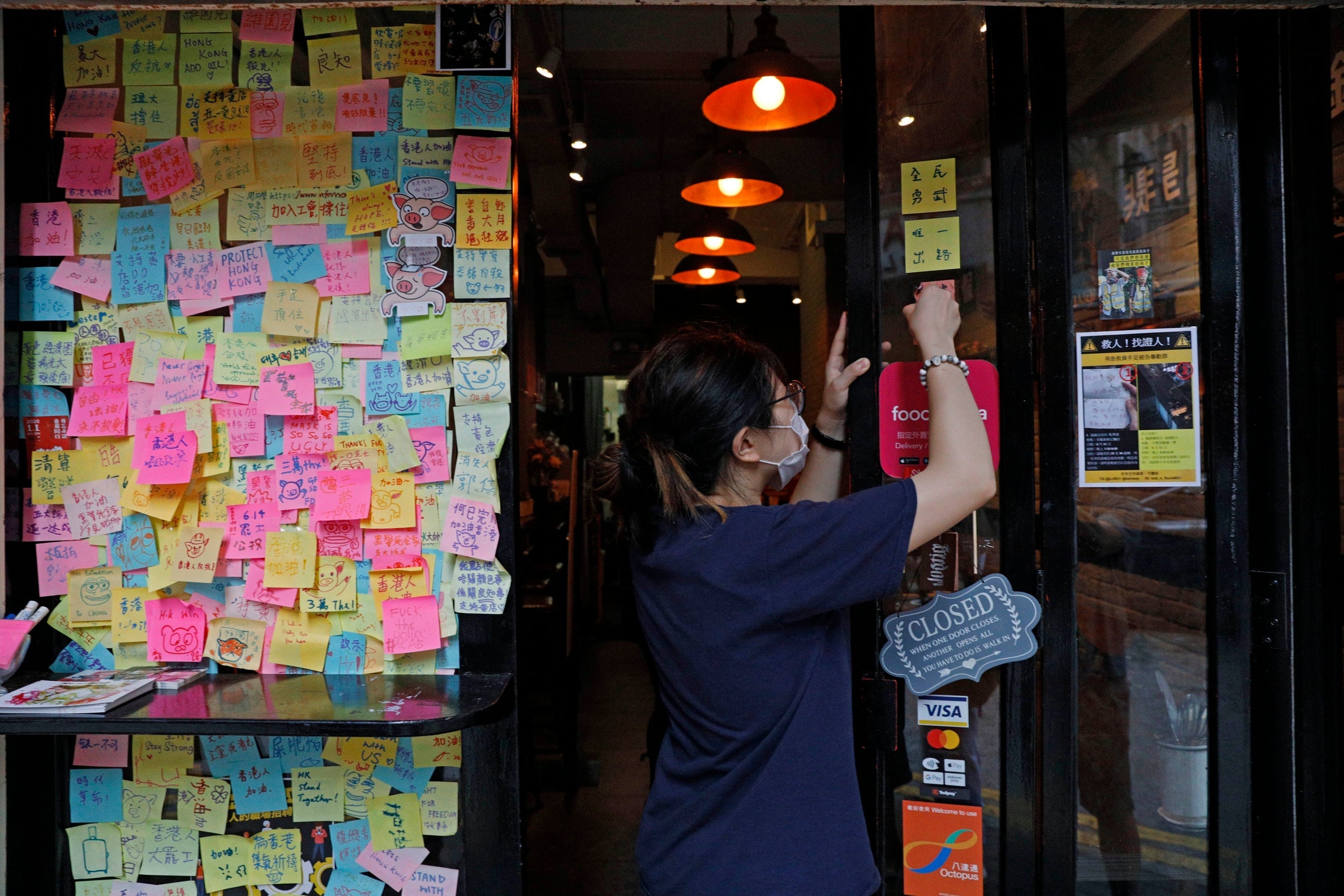Hong Kong’s protesters ‘prepare for long fight’ as China tightens grip
Fear now lingers in a city once known as a haven for free-thinkers. Ryan Ho Kilpatrick speaks to activists about whether they will continue to protest – or try and relocate

Your support helps us to tell the story
From reproductive rights to climate change to Big Tech, The Independent is on the ground when the story is developing. Whether it's investigating the financials of Elon Musk's pro-Trump PAC or producing our latest documentary, 'The A Word', which shines a light on the American women fighting for reproductive rights, we know how important it is to parse out the facts from the messaging.
At such a critical moment in US history, we need reporters on the ground. Your donation allows us to keep sending journalists to speak to both sides of the story.
The Independent is trusted by Americans across the entire political spectrum. And unlike many other quality news outlets, we choose not to lock Americans out of our reporting and analysis with paywalls. We believe quality journalism should be available to everyone, paid for by those who can afford it.
Your support makes all the difference.Despite the sweltering summer temperatures, a cold new atmosphere settled on Hong on Thursday.
Local businesses around the city were cowed into tearing down the posters on their walls supporting the pro-democracy movement and the “Lennon Wall” Post-it notes scrawled with encouraging messages for or by protesters. Online, residents deactivated their Twitter accounts and deleted Facebook posts lambasting the government and the police.
With the implementation of a draconian new National Security Law criminalising separatism, subversion, terrorism, and collusion with foreign forces, Hong Kong had transformed from a haven for free-thinkers to a place where Post-it notes could mean years in prison.
The day before, thousands of people opposed to the law streamed into the streets but, at first, were eerily silent – unsure of what they could safely chant. Stalwarts like “Free Hong Kong, revolution of our time!” were now deemed subversive and secessionist by the police.
It wasn’t the first time Hong Kong’s official birthday was turned into an occasion for mass protest. For the past 17 years the 1 July march has been a fixture in the political calendar, ever since the government tried to push through its own national security bill in 2003. After 500,000 people took to the streets, they blinked and withdrew it.

But 2020 marked the first time that the march was banned by the police, citing disorder at past protests and social distancing rules that exclusively limit outdoor gatherings.
For many Hongkongers, it was also the beginning of a dark new age for the city.
“I want to stay but I don’t know how I can spend the rest of my life like this,” says student protester Louise. “I’m going to have to get used to either lying about my political leanings or being quiet about it – for the rest of my life.” Like many others she had already scrubbed content from her social media profiles critical of the government.
Another protester, Jess, reveals she is considering relocating to Taiwan.
“Many of my friends are planning to leave, especially those with kids,” she says.

“What’s scariest is not knowing the definitions of this law and the paranoia of not knowing who’s going to rat me out,” she says.
This week, former Hong Kong leader CY Leung this week offered a HK$1m (£103,000) bounty for the arrest of law-breakers in Hong Kong or abroad.
“I feel angry at the government but also proud of all the others who have decided to take the risk and come join me. The hope of Hong Kong is in its people,” Jess continues.
Another pro-democracy demonstrator, Louise, says the new law makes her feel much more scared but also more motivated to come out. Besides, she muses, “if we can get arrested just for saying something now, maybe protesting isn’t such a big deal anymore.”
“I protest differently now,” 22-year-old Bob says as the marchers tried to avoid the thousands of police kettling them in, “like not bringing any materials calling for interest, but still chanting the same slogans.” Police cameras still peered overhead, trying to record the masked faces mouthing the now-forbidden words.
Over the past year, he recalls, the movement has learnt to change tactics many times, adapting to new challenges like the prevalence of undercover police and the shutting down of public transportation on protest days. During the coronavirus pandemic they had to start honing their skills at pushing for their cause off the streets and online, something he believes they will continue to improve at.
Like most protesters behind the movement that began last year in response to a proposed extradition bill allowing suspects to be sent to mainland China, Bob and Louise do not have British National (Overseas) passports that could provide a pathway to citizenship in the UK, according to measures newly announced by London. Born after the 1997 handover, they are not even eligible.
They do not have a lifeboat to escape from an increasingly authoritarian Hong Kong, but they do still have strong emotional ties to their hometown, and hope for the future.
“If we give up now we’ll never make it far enough to see what’s possible,” says Louise, who admits she probably will not see a democratic Hong Kong in her lifetime.
“If it’s years away then we’ll stay here for years, and grow into adults who never forget what happened,” she says. “The timeline is long – that’s something we have to accept – so let’s prepare for a long fight.”
Join our commenting forum
Join thought-provoking conversations, follow other Independent readers and see their replies
Comments